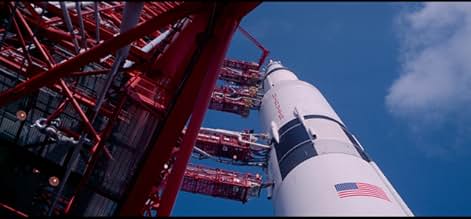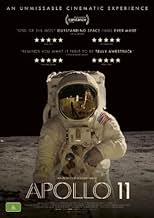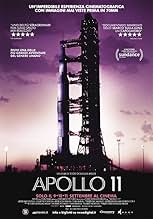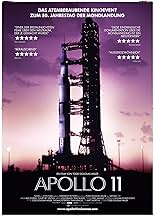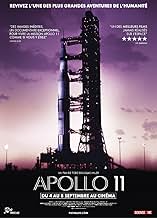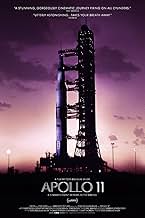PUNTUACIÓN EN IMDb
8,1/10
28 mil
TU PUNTUACIÓN
La misión Apollo 11 aterriza en la luna dirigida por Neil Armstrong y pilotada por Buzz Aldrin and Michael Collins.La misión Apollo 11 aterriza en la luna dirigida por Neil Armstrong y pilotada por Buzz Aldrin and Michael Collins.La misión Apollo 11 aterriza en la luna dirigida por Neil Armstrong y pilotada por Buzz Aldrin and Michael Collins.
- Ganó 3 premios Primetime Emmy
- 59 premios y 45 nominaciones en total
Neil Armstrong
- Self - Mission Commander
- (metraje de archivo)
Mike Collins
- Self - Command Module Pilot
- (metraje de archivo)
Buzz Aldrin
- Self - Lunar Module Pilot
- (metraje de archivo)
- (as Edwin 'Buzz' Aldrin)
Deke Slayton
- Self - Director of Flight Crew Operations
- (metraje de archivo)
Clifford E. Charlesworth
- Self - Flight Director Green Team
- (metraje de archivo)
Bruce McCandless II
- Self - Capsule Commuicator (CAPCOM) Green Team
- (metraje de archivo)
- (as Bruce McCandless)
Charles Duke
- Self - Capsule Communicator (CAPCOM) White Team
- (metraje de archivo)
Gene Kranz
- Self - Flight Director White Team
- (metraje de archivo)
Jim Lovell
- Self - Backup Commander
- (metraje de archivo)
John F. Kennedy
- Self - President of the United States of America
- (metraje de archivo)
Janet Armstrong
- Self
- (metraje de archivo)
Patricia Mary Finnegan
- Self
- (metraje de archivo)
Andy Aldrin
- Self
- (metraje de archivo)
Joan Ann Archer
- Self
- (metraje de archivo)
- (sin acreditar)
Walter Cronkite
- Self
- (metraje de archivo)
- (sin acreditar)
Lyndon B. Johnson
- Self
- (metraje de archivo)
- (sin acreditar)
Argumento
¿Sabías que...?
- CuriosidadesSeveral of the recordings captured by the astronauts during the mission are featured in this documentary. These recordings by Neil Armstrong, Buzz Aldrin and Mike Collins earned them honorary memberships in the American Society of Cinematographers.
- PifiasThe incident involving Buzz Aldrin's bio-med sensors going out, leading him to crack wise, saying, "I promise I will let you know if I stop breathing," occurred during the return voyage, on day 8 of the mission, but is depicted (at approx 48 minutes into the film) as happening during the approach to the moon before the separation of the command and lunar modules.
- Citas
Neil Armstrong: One small step for man... one giant leap for mankind.
- Versiones alternativasIn 2019, an edited version of the film, cut down to 45 minutes for exhibition in museum IMAX theaters, was released as Apollo 11: First Steps.
- ConexionesFeatured in WatchMojo: Top 10 Best Movies of 2019 (So Far) (2019)
- Banda sonoraMother Country
Written and Performed by John Stewart
Reseña destacada
A half-century ago, Neil Armstrong stepped off the ladder of the Lunar Module Eagle and into the history books. In the decades since, that moment and the flights of NASA's Apollo program have been chronicled in seemingly countless documentaries. At the top of that list remains 1989's For All Mankind from the late Al Reinert and 2007's In The Shadow Of The Moon from British filmmakers David Sington and Christopher Riley. Up there with them now is 2019's Apollo 11, an exciting new film from Todd Douglas Miller that is begging for you to see it on the biggest screen possible.
Why?
In part because of Miller who, like those other great filmmakers of Apollo before him, wasn't content to merely do a rehash of what had come before. Miller's Apollo 11 is in part a deep dive into the NASA archives, uncovering things that even the most seasoned space enthusiast has likely never seen before. There's a wealth of pre-launch footage, for example, tracing the preparations from the rollout of the massive Saturn V rocket to the launch pad to multiple perspectives of the launch itself. Even when events move into space, there's still a wealth of rare material to experience including conversations between the astronauts themselves as well as between them and Mission Control in Houston. Even where footage that has become synonymous with the mission and the era such as the stage separations of the rocket or the Lunar Module's descent to the surface of the Moon, it's presented with clarity and scale rarely seen elsewhere. For that alone, the film renders excellent service.
It does so in other ways, as well. Unlike those two documentaries I mentioned at the top of this review, Miller doesn't use astronaut interviews (either aural or visual) to help tell the story. Instead, Apollo 11 unfolds entirely through archival sources ranging from the transmissions to the voice of NASA's public affairs or well-known TV commentators like Walter Cronkite. To help aid visually for parts of the mission where there isn't much or anything to show, the film employees simple animation alongside such commentaries. The film also makes effective use of split-screen and captions to portray mission control or to show events such as the actual walk on the Moon from multiple perspectives. As much as the footage itself on a cinema screen does, it presents the sheer scale of the endeavor but without losing the viewer in the technicalities involved in spaceflight.
In some ways, that's the greatest triumph of Apollo 11 the documentary. It's a film keen to present Apollo 11 the mission in awe-inspiring yet understandable terms, one that emphasizes how incredible in scope and achievement that flight five decades ago this July was. It's also a reminder, at a time when cinema screens find themselves increasingly dominated by would-be blockbusters and superhero flicks, of the raw power of cinema to present stories. Both of those are things we need reminding of, it seems, and the film does a superb job of both.
Why?
In part because of Miller who, like those other great filmmakers of Apollo before him, wasn't content to merely do a rehash of what had come before. Miller's Apollo 11 is in part a deep dive into the NASA archives, uncovering things that even the most seasoned space enthusiast has likely never seen before. There's a wealth of pre-launch footage, for example, tracing the preparations from the rollout of the massive Saturn V rocket to the launch pad to multiple perspectives of the launch itself. Even when events move into space, there's still a wealth of rare material to experience including conversations between the astronauts themselves as well as between them and Mission Control in Houston. Even where footage that has become synonymous with the mission and the era such as the stage separations of the rocket or the Lunar Module's descent to the surface of the Moon, it's presented with clarity and scale rarely seen elsewhere. For that alone, the film renders excellent service.
It does so in other ways, as well. Unlike those two documentaries I mentioned at the top of this review, Miller doesn't use astronaut interviews (either aural or visual) to help tell the story. Instead, Apollo 11 unfolds entirely through archival sources ranging from the transmissions to the voice of NASA's public affairs or well-known TV commentators like Walter Cronkite. To help aid visually for parts of the mission where there isn't much or anything to show, the film employees simple animation alongside such commentaries. The film also makes effective use of split-screen and captions to portray mission control or to show events such as the actual walk on the Moon from multiple perspectives. As much as the footage itself on a cinema screen does, it presents the sheer scale of the endeavor but without losing the viewer in the technicalities involved in spaceflight.
In some ways, that's the greatest triumph of Apollo 11 the documentary. It's a film keen to present Apollo 11 the mission in awe-inspiring yet understandable terms, one that emphasizes how incredible in scope and achievement that flight five decades ago this July was. It's also a reminder, at a time when cinema screens find themselves increasingly dominated by would-be blockbusters and superhero flicks, of the raw power of cinema to present stories. Both of those are things we need reminding of, it seems, and the film does a superb job of both.
- timdalton007
- 23 mar 2019
- Enlace permanente
Selecciones populares
Inicia sesión para calificar y añadir a tu lista para recibir recomendaciones personalizadas
Detalles
- Fecha de lanzamiento
- País de origen
- Sitios oficiales
- Idioma
- Títulos en diferentes países
- Apollo 11. Primeros pasos
- Localizaciones del rodaje
- Sea of Tranquility, The Moon, Space(Apollo 11 landing site)
- Empresas productoras
- Ver más compañías en los créditos en IMDbPro
Taquilla
- Recaudación en Estados Unidos y Canadá
- 9.039.891 US$
- Fin de semana de estreno en EE. UU. y Canadá
- 1.607.040 US$
- 3 mar 2019
- Recaudación en todo el mundo
- 15.343.649 US$
- Duración1 hora 33 minutos
- Color
- Mezcla de sonido
- Relación de aspecto
- 2.20 : 1
Contribuir a esta página
Sugerir un cambio o añadir el contenido que falta

Principal laguna de datos
What is the streaming release date of Apolo 11 (2019) in Australia?
Responde





